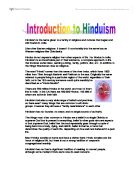Religion, Poverty and Wealth-Hinduism (8)
Poverty is now a problem on a global scale, and Hinduism has needed, and will continue to need, to undertake an ongoing state of change and adaptation. Many of the beliefs Hindus held only a couple of centuries ago have been altered or even removed altogether. The globalisation of Hinduism, bringing it into contact with a wide range of other cultures and religions, has influenced this a lot. Hinduism, however, is full of variations itself, so what is said of Hinduism may be true for some Hindus, and false for others. Hinduism is less a religion, than a culture, and way of life. This way of life affects how they view poverty and wealth, and what there reactions to it are, as outlined below.
Unlike many other societies, where the caste system is based on power or wealth, thus giving the poorest the least power, Hinduism has four set castes, which a member belongs to by birth. These groups are called varnas, and each has its own set of rules and duties to live by, known as dharma. Too much inter-varna mixing, especially intermarriage, is strongly disapproved of. The first, and highest varna is that of a Brahmin-priests, teachers, and wisemen. The next is Kshatriya-warriors, rulers, and leaders. The third is Vaishya-traders, merchants, agriculture, and other work involved with commerce. The final, and lowest varna is Sudra-manual labour and service. In many societies, the difference between the high and the low, in terms of social status, has caused great troubles, due to discontentment of the poor and weak to continue living like they are. In Hinduism, however, this problem is avoided, by the promise of being born into a better life next time, and a higher varna, for those who follow the dharma well. This attitude, of following the dharma above all else, mainly comes from a Hindu text called the Bhagavad Gita, in which a powerful prince and general has to go to war according to his class (Kshatriya) dharma, but does not feel it is the right thing to do. His charioteer, Lord Krishna, an incarnation of Vishnu, tells and persuades him that the most important thing is to follow your dharma, rather than be guided by a judgement of right and wrong.







